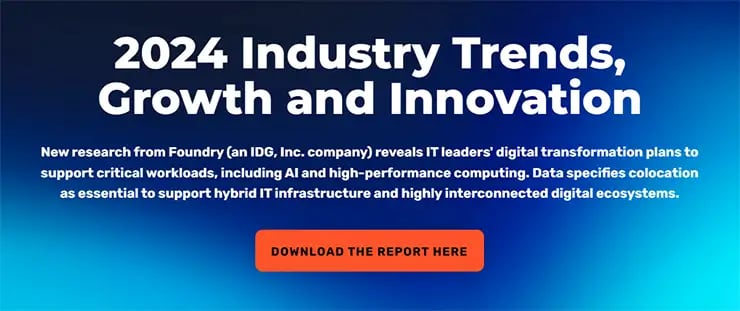
Executive Corner: Data Centers and the Future of Hybrid Cloud
For IT leaders and other senior executives, the current technology environment is the best of times and the worst of times. Best, because there have never been so many existing and emerging products to achieve better business outcomes with fewer resources. Worst, because the constant emergence of new options makes it difficult to commit to a long-term path today.
IT has moved far from its conventional support role into a revenue and innovation center. Now, leaders are looking for flexible solutions to accelerate application development and deployment, stabilize mission-critical operations, reduce the cost of storage and compute, and deliver content and communications across the world.
They're also seeking new and inventive approaches to protect the business from a growing array of existential threats, while improving their use of data analytics, artificial intelligence, internet of things, and customer journey orchestration coming from the cloud model in the foreseeable future. While we've seen abundant transformation since the internet enabled private clouds in the 1990s, I believe the next decade will bring an even greater rate of change.
Cloud technologies have already disrupted the way businesses run. Public clouds offer cost-effective compute, storage, and other essential components like analytics or content delivery, while private clouds deliver unrivaled control and security to meet today's business demands. But as IT leaders look to modernize their IT environments and help their organizations transition to an all-digital model, they're increasingly looking at hybrid cloud as the next major advancement. And there is no better place to execute hybrid cloud and retain future options than in a colocation data center with a very strong cloud and managed services ecosystem.
The massive momentum of the hybrid movement
Hybrid IT enables enterprises to close the gap between the legacy enterprise IT model and what modern cloud-based products can achieve. And IT execs are taking note. By 2020, 90 percent of organizations are expected to adopt some level of hybrid infrastructure management, as the push to optimize costs and increase efficiency continues to ramp. Rightscale's 2018 State of the Cloud Report shows that hybrid environments are already the preferred enterprise strategy for more than half of all organizations, with 81 percent pursuing multi-cloud strategies.
The reason for the jump is pretty simple: organizations aren't ready to move all their data and workloads to the cloud, so many are deploying hybrid cloud strategies that combine on-premises IT with cloud services. Hybrid environments give CIOs and other IT leaders the flexibility to mix and match how and where to execute workloads (as some are better suited to one environment over another, and costs charged by the different cloud providers vary over time), helping them become more competitive through increased business agility and greater efficiency. Hybrid cloud also provides a buffer for IT execs wary of risk, allowing a methodical path forward for future cloud migration without going all-in at once.
How data centers will make the difference
A hybrid cloud strategy is only as strong as the data centers it is built upon. Data centers are the heart and soul of an effective hybrid cloud strategy, combining existing private cloud deployments with ready-made resources like compute, development, networking, storage, content delivery, some artificial intelligence, data analytics and other applications offered today and in the future by public cloud providers like AWS, Microsoft Azure, Google, and Alibaba Cloud, among others.
Hybrid environments position companies to be able to quickly and nimbly take advantage of major cloud products which are developed and deployed in the future. Fully realizing the value of a hybrid environment-such as moving workloads effortlessly between private and public clouds as business needs change, enhancing data security and access control, and minimizing hardware and software to manage-ultimately depends on having a data center service designed with hybrid in mind.
Hybrid-ready data centers should feature ultra low-latency connectivity and offer high-density, scalable infrastructure and the ability to add capacity and power as your demands evolve-all in major edge markets for closer proximity to end users and customers. At the same time, they should feature a robust ecosystem of cloud, network and IT partners who follow industry best practices for optimizing hybrid cloud environments and enable customers to build out a holistic solution that meets their specific needs.
CoreSite for the hybrid needs of the future
CoreSite has made a concerted effort to position itself as a leader in cloud-connected data centers of the future. CoreSite facilities are strategically located in urban cores spread across eight edge US markets and provide comparatively better power efficiency, cost, flexibility and scalability than on-premises data rooms or other data center providers.
Supported by a large and constantly growing roster of network, cloud, and IT services providers like AWS, Microsoft, Google, Alibaba, and hundreds more, the CoreSite ecosystem will provide easy access to high-quality cloud and related services, along with secure, low-latency, high bandwidth connections to end users today's and tomorrow's IT architectures will demand.
Beyond exceptional facilities and an expansive (and growing) partner network, our staff makes a tremendous difference. Customers choose CoreSite because of our dedication to an exceptional customer experience. From our move-in assistance and remote hands to our aggressive service level agreements and customizable cost models, CoreSite customers can expect responsive, diligent and professional service from industry experts every step of the way.
Contact us today to learn how CoreSite is your one-stop-shop for all your hybrid cloud needs.









